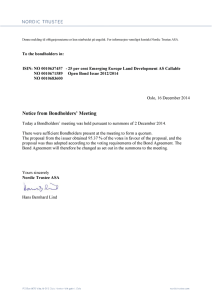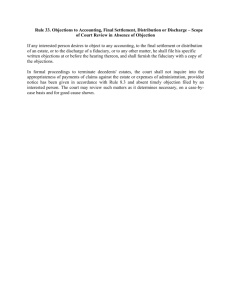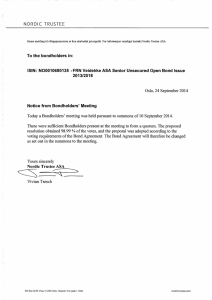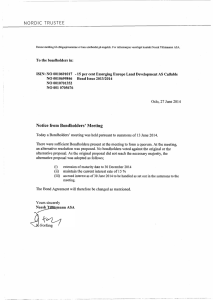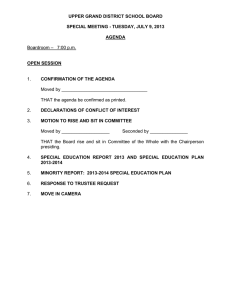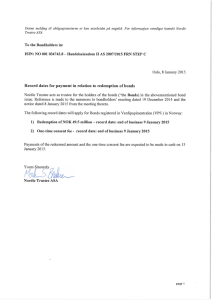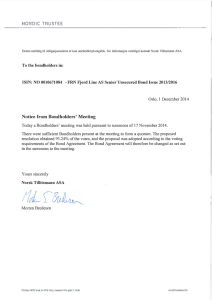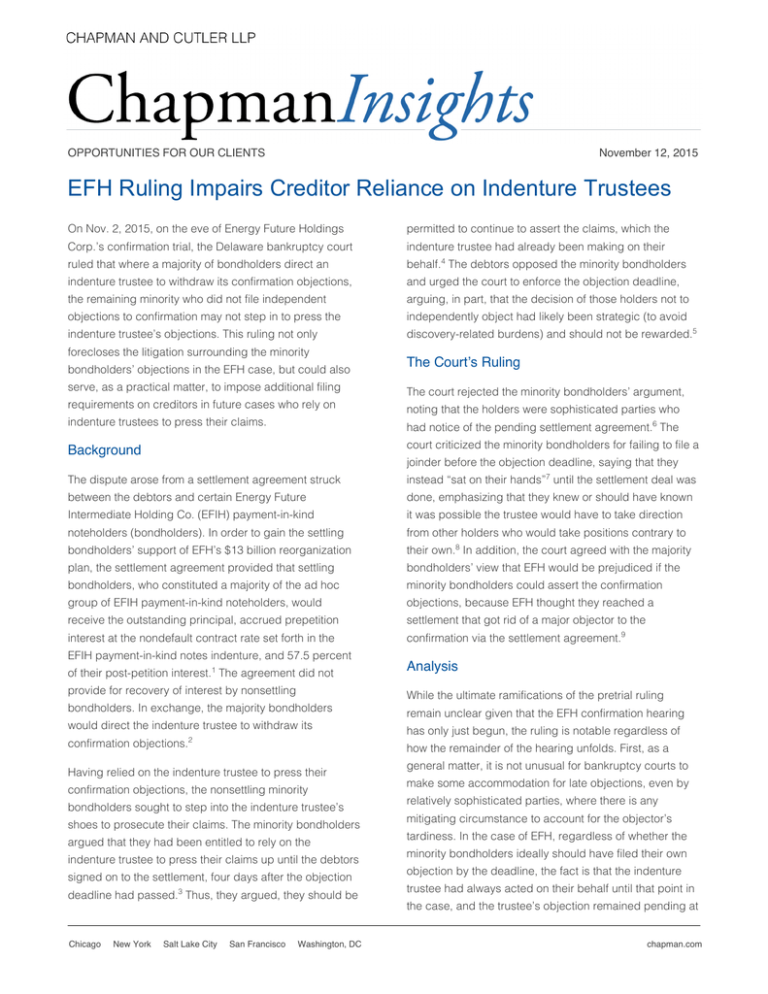
OPPORTUNITIES FOR OUR CLIENTS
November 12, 2015
EFH Ruling Impairs Creditor Reliance on Indenture Trustees
On Nov. 2, 2015, on the eve of Energy Future Holdings
permitted to continue to assert the claims, which the
Corp.’s confirmation trial, the Delaware bankruptcy court
indenture trustee had already been making on their
ruled that where a majority of bondholders direct an
behalf.4 The debtors opposed the minority bondholders
indenture trustee to withdraw its confirmation objections,
and urged the court to enforce the objection deadline,
the remaining minority who did not file independent
arguing, in part, that the decision of those holders not to
objections to confirmation may not step in to press the
independently object had likely been strategic (to avoid
indenture trustee’s objections. This ruling not only
discovery-related burdens) and should not be rewarded.5
forecloses the litigation surrounding the minority
bondholders’ objections in the EFH case, but could also
The Court’s Ruling
serve, as a practical matter, to impose additional filing
The court rejected the minority bondholders’ argument,
requirements on creditors in future cases who rely on
noting that the holders were sophisticated parties who
indenture trustees to press their claims.
had notice of the pending settlement agreement.6 The
Background
court criticized the minority bondholders for failing to file a
The dispute arose from a settlement agreement struck
instead “sat on their hands”7 until the settlement deal was
between the debtors and certain Energy Future
done, emphasizing that they knew or should have known
Intermediate Holding Co. (EFIH) payment-in-kind
it was possible the trustee would have to take direction
noteholders (bondholders). In order to gain the settling
from other holders who would take positions contrary to
bondholders’ support of EFH’s $13 billion reorganization
their own.8 In addition, the court agreed with the majority
plan, the settlement agreement provided that settling
bondholders’ view that EFH would be prejudiced if the
bondholders, who constituted a majority of the ad hoc
minority bondholders could assert the confirmation
group of EFIH payment-in-kind noteholders, would
objections, because EFH thought they reached a
receive the outstanding principal, accrued prepetition
settlement that got rid of a major objector to the
interest at the nondefault contract rate set forth in the
confirmation via the settlement agreement.9
joinder before the objection deadline, saying that they
EFIH payment-in-kind notes indenture, and 57.5 percent
of their post-petition interest.1 The agreement did not
Analysis
provide for recovery of interest by nonsettling
While the ultimate ramifications of the pretrial ruling
bondholders. In exchange, the majority bondholders
remain unclear given that the EFH confirmation hearing
would direct the indenture trustee to withdraw its
has only just begun, the ruling is notable regardless of
confirmation objections.2
how the remainder of the hearing unfolds. First, as a
Having relied on the indenture trustee to press their
confirmation objections, the nonsettling minority
bondholders sought to step into the indenture trustee’s
shoes to prosecute their claims. The minority bondholders
argued that they had been entitled to rely on the
indenture trustee to press their claims up until the debtors
signed on to the settlement, four days after the objection
deadline had passed.3 Thus, they argued, they should be
Chicago
New York
Salt Lake City
San Francisco
Washington, DC
general matter, it is not unusual for bankruptcy courts to
make some accommodation for late objections, even by
relatively sophisticated parties, where there is any
mitigating circumstance to account for the objector’s
tardiness. In the case of EFH, regardless of whether the
minority bondholders ideally should have filed their own
objection by the deadline, the fact is that the indenture
trustee had always acted on their behalf until that point in
the case, and the trustee’s objection remained pending at
chapman.com
the time of the objection deadline. Not allowing the
well, to protect itself in case of a group breakup. Time
minority bondholders to step into the trustee’s shoes
(and, perhaps, further developments in the EFH
under those circumstances therefore, strikes one as a bit
confirmation process) will tell whether joinders or
less forgiving than is typical.
independently filed objections in such cases become
Second, the prejudice to the debtors identified by the
commonplace.
court was not of a nature that traditionally would be given
1
See Amended and Restated Plan Support Agreement [DI
6699-1] at 2.
secure a victory without consideration of the merits
2
Id. at 14.
typically is viewed as being more in the nature of a
3
Hearing Trans. 13:9-24, Nov. 2, 2015.
windfall than a legally cognizable prejudice. Cognizable
4
Id.
5
Id. at 16:14-17:11
6
Id. at 24:16-19.
the would-be objector’s argument. Here, the prejudice
7
Id. at 22:5-7.
identified by the court was to the debtors, but not
8
Id. at 24:13-16, 22:5-9.
because their ability to defend against an objection would
9
Id. at 22:22-25.
great weight in determining whether to allow a late
objection. That is because the mere loss of the ability to
prejudice typically goes to process (e.g., where a debtor
has had insufficient time to prepare for trial as a result of a
tardily imposed objection) rather than to the substance of
be compromised by a late objection, but because they
“thought that they reached a settlement and got rid of a
10 Id.
major objector to the confirmation in a settlement
agreement.”10
Conclusion
Although the EFH confirmation hearing is still ongoing,
pending different developments in this case or published
guidance in future cases, individual noteholders who are
relying on their indenture trustees to protect their rights
would be well-advised to interpose their own individual
objections and joinders so their arguments are not later
foreclosed if the indenture trustee unexpectedly declines
to act. And while distinguishable, one might argue by
extension that any individual party in interest that is part of
a group objection should be filing a separate joinder as
Chicago
New York
This document has been prepared by Chapman and Cutler LLP attorneys
for informational purposes only. It is general in nature and based on
authorities that are subject to change. It is not intended as legal advice.
Accordingly, readers should consult with, and seek the advice of, their
own counsel with respect to any individual situation that involves the
material contained in this document, the application of such material to
their specific circumstances, or any questions relating to their own affairs
that may be raised by such material.
To the extent that any part of this summary is interpreted to provide tax
advice, (i) no taxpayer may rely upon this summary for the purposes of
avoiding penalties, (ii) this summary may be interpreted for tax purposes
as being prepared in connection with the promotion of the transactions
described, and (iii) taxpayers should consult independent tax advisors.
© 2015 Chapman and Cutler LLP. All rights reserved. Attorney Advertising
Material.
Originally published November 12, 2015 in Law360.
Steven Wilamowsky
Hannah Wendling
Partner
Associate
Steve is a partner in the Litigation,
Bankruptcy and Restructuring
Group. He regularly represents
investors, creditors, and lenders in
complex restructurings, in and out
of bankruptcy court.
Hannah is an associate in the
Litigation, Bankruptcy and
Restructuring Group. She represents
banks and other financial institutions
in complex commercial and
bankruptcy litigation.
New York Office
Chicago Office
T: 212.655.2532
T: 312.845.3910
F: 212.655.3332
F: 312.516.1920
wilamowsky@chapman.com
wendling@chapman.com
Salt Lake City
San Francisco
Washington, DC
2

